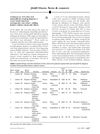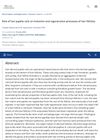 May 2024 in “Journal of cosmetic dermatology”
May 2024 in “Journal of cosmetic dermatology” Heat-treated Limosilactobacillus fermentum with menthol, salicylic acid, and panthenol promotes hair growth and balances scalp microbiome in people with androgenetic alopecia.
 December 2023 in “European Journal of Pharmacology”
December 2023 in “European Journal of Pharmacology” C3G and Vitisin A may help prevent hair loss by blocking male hormones and stopping hair cell death.
 3 citations
,
September 2022 in “Molecules”
3 citations
,
September 2022 in “Molecules” Camellia seed cake extract may help hair growth by blocking the hair loss effects of a hormone called DHT.
 4 citations
,
May 2022 in “Journal of Drug Delivery Science and Technology”
4 citations
,
May 2022 in “Journal of Drug Delivery Science and Technology” Nanoliposomes effectively deliver hair-growth peptides into hair follicles.
 4 citations
,
January 2022 in “Journal of Bioscience and Bioengineering”
4 citations
,
January 2022 in “Journal of Bioscience and Bioengineering” Electric stimulation can increase hair growth by activating certain genes in skin cells.
17 citations
,
November 2021 in “Journal of Cosmetic Dermatology” Combination therapies for androgenetic alopecia work best but can have significant side effects and costs.
2 citations
,
October 2021 in “Experimental Cell Research” Injectable platelet-rich fibrin helps hair growth by boosting key cell functions.
 38 citations
,
July 2021 in “ACS Nano”
38 citations
,
July 2021 in “ACS Nano” Microneedles help treat hair loss by improving hair surroundings and promoting growth.
9 citations
,
July 2021 in “Journal of Medicinal Food” Lactobacillus paracasei HY7015 helps hair grow in mice.
 16 citations
,
April 2021 in “International Journal of Molecular Sciences”
16 citations
,
April 2021 in “International Journal of Molecular Sciences” Micro-current stimulation may promote hair growth more effectively than standard treatments.
 14 citations
,
February 2021 in “International Journal of Pharmaceutics”
14 citations
,
February 2021 in “International Journal of Pharmaceutics” Deer antler velvet serum helps hair grow and is safe for skin.
 2 citations
,
January 2021 in “Journal of The American Academy of Dermatology”
2 citations
,
January 2021 in “Journal of The American Academy of Dermatology” Low-dose oral minoxidil for hair loss seems to have rare side effects, but more research is needed to confirm its safety.
 8 citations
,
October 2020 in “International Journal of Molecular Sciences”
8 citations
,
October 2020 in “International Journal of Molecular Sciences” Nonanal from fruits and vegetables promotes hair growth by increasing growth factors.
 86 citations
,
July 2020 in “International Journal of Molecular Sciences”
86 citations
,
July 2020 in “International Journal of Molecular Sciences” Activating the Wnt/β-catenin pathway could lead to new hair loss treatments.
 7 citations
,
June 2020 in “Translational Andrology and Urology”
7 citations
,
June 2020 in “Translational Andrology and Urology” Finasteride for hair loss may cause lasting sexual, genitourinary, mental, and anti-androgenic side effects in young men.
 23 citations
,
January 2020 in “Frontiers in Pharmacology”
23 citations
,
January 2020 in “Frontiers in Pharmacology” Dihydrotestosterone affects hair growth by changing the Wnt/β-catenin pathway, with low levels helping and high levels hindering growth.
 35 citations
,
January 2020 in “Skin Pharmacology and Physiology”
35 citations
,
January 2020 in “Skin Pharmacology and Physiology” The review concluded that keeping the hair-growing ability of human dermal papilla cells is key for hair development and growth.
 26 citations
,
December 2019 in “Neurobiology of Stress”
26 citations
,
December 2019 in “Neurobiology of Stress” Post-finasteride syndrome causes lasting sexual, neurological, and physical side effects in some people after taking finasteride.
 10 citations
,
August 2019 in “The World Journal of Men's Health”
10 citations
,
August 2019 in “The World Journal of Men's Health” Kimchi probiotics slightly improved hair density, but more research needed.
 10 citations
,
April 2019 in “Journal of Analytical Science and Technology”
10 citations
,
April 2019 in “Journal of Analytical Science and Technology” Lactobacillus plantarum hydrolysates may help increase hair growth by boosting VEGF production.
 52 citations
,
September 2018 in “International Journal of Molecular Sciences”
52 citations
,
September 2018 in “International Journal of Molecular Sciences” Ginseng and its compounds may help hair growth and prevent hair loss, but more human trials are needed to confirm this.
20 citations
,
February 2018 in “Cell transplantation” Cinnamomum osmophloeum leaf extract may help treat hair loss by promoting hair growth and increasing hair cell proliferation.
 30 citations
,
December 2017 in “Medical Hypotheses”
30 citations
,
December 2017 in “Medical Hypotheses” The model suggests that scalp tension could lead to hair loss, with factors like blood vessel hardening, enlarged oil glands, and poor microcirculation also playing a role. It also hints at a possible link between skull shape and baldness pattern.
 82 citations
,
August 2017 in “Cell Reports”
82 citations
,
August 2017 in “Cell Reports” An imbalanced gut and lack of biotin can cause hair loss in mice.
 36 citations
,
February 2017 in “BMC Complementary and Alternative Medicine”
36 citations
,
February 2017 in “BMC Complementary and Alternative Medicine” Geranium sibiricum extract helps hair grow and is more effective than minoxidil but can be toxic in high concentrations.
 47 citations
,
October 2016 in “Molecular and Cellular Endocrinology”
47 citations
,
October 2016 in “Molecular and Cellular Endocrinology” Androgens prevent hair growth by changing Wnt signals in cells.
 49 citations
,
November 2014 in “Journal of Medicinal Food”
49 citations
,
November 2014 in “Journal of Medicinal Food” Red Ginseng Extract may help human hair grow by activating growth pathways and blocking negative effects of certain hormones.
 42 citations
,
March 2014 in “European Journal of Pharmacology”
42 citations
,
March 2014 in “European Journal of Pharmacology” Ginsenoside F2 from ginseng may increase hair growth better than standard treatments by affecting cell growth signals.
 122 citations
,
November 2010 in “Journal of Dermatological Science”
122 citations
,
November 2010 in “Journal of Dermatological Science” Male pattern baldness involves hormones and cell signals affecting hair growth.
 28 citations
,
March 2010 in “Histochemistry and cell biology”
28 citations
,
March 2010 in “Histochemistry and cell biology” Skin cells can help create early hair-like structures in lab cultures.
 80 citations
,
June 2008 in “Biomaterials”
80 citations
,
June 2008 in “Biomaterials” EVAL membranes help create cell structures that can regrow hair follicles.
141 citations
,
November 2007 in “Journal of Investigative Dermatology” Balding cells age faster due to stress, suggesting stress-targeting treatments for hair loss.
56 citations
,
June 2002 in “Biomaterials” Controlled release of VEGF in a collagen hydrogel boosts hair growth in mice.































